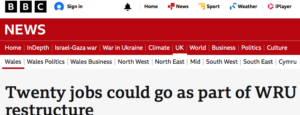- Death wish - 23rd February 2026
- Return to sender - 20th February 2026
- Legal eagle - 19th February 2026

During 23 years with the BBC, and 41 years in journalism (when he was trained to use simple language, avoiding jargon), for our Editor, Welshman Phil Parry, it was always paramount to see the reality of statements from troubled organisations, and the spotlight is thrown on this by the Welsh Rugby Union (WRU) saying the previous regime had a lack of a ‘clear budget’ and ‘no data’, yet the national team has been on one of the worst losing streaks in rugby history, with its performance described as “shambolic”…
Invariably after what happened there would be a ‘restructuring’, or it was all the fault of the previous management team.
 If an organisation is in trouble, you expose what has taken place and in a statement in the hours before a story is published (or afterwards), usually one of these things is said, or a combination of all of them:
If an organisation is in trouble, you expose what has taken place and in a statement in the hours before a story is published (or afterwards), usually one of these things is said, or a combination of all of them:
- The information is old and internal procedures have already changed.
- After a ‘consultation’ there has been a ‘reset’ and ‘transformative restructuring’ has taken place.
- This happened under the old regime, and it is different under the new one.
Last week Welsh rugby union’s governing body the Welsh Rugby Union (WRU) opted for a mixture of the second as well as the third ones, and the result would make a fine comedy sketch if it wasn’t reality!
 The BBC (perhaps accepting the official line) said on its website: ‘The Welsh Rugby Union will cut up to 20 roles as it implements a restructure aimed at saving £5m a year.
The BBC (perhaps accepting the official line) said on its website: ‘The Welsh Rugby Union will cut up to 20 roles as it implements a restructure aimed at saving £5m a year.

‘It said the “transformative programme” would involve savings and efficiencies in the business and would allow the governing body to operate” in a manner befitting of a £100m-a-year business.
‘The organisation which employs 344 people added it has entered a formal consultation period with staff.’
But any Welsh rugby fan might be forgiven for thinking that a better restructuring would mean the national team could actually start winning some matches!


Don’t forget Scotland won against Wales by 35 points to 29, with even the BBC saying the performance was “shambolic”, and after a huge loss against England (the team’s heaviest-ever defeat in Cardiff), they said: “Welsh rugby has had some troubling times in the past 18 months. Allowing England to run riot in their Cardiff home will rank as the lowest point. Ten tries and a 68-14 defeat. It beggars belief”.
This time, however, it was all about the ‘transformation’, and WRU Chief Executive Officer (CEO) Abi Tierney said everything the organisation is doing is to “improve rugby in Wales for everyone”.

Again rugby fans may be disconcerted by this pronouncement, because improving “rugby in Wales for everyone” would really mean an improvement in a ‘shambolic’ performance by the national team on the pitch!
Wales became the unwanted history boys with a 17th successive defeat, the most for a tier-one nation in the professional era and equalling Scotland’s losing streak between 1951 and 1955.
Whether Wales should still be considered a tier-one nation, having slipped below Georgia in the world rankings to 12th, is now questionable.

It had been 525 days since their previous Test victory in October 2023 when they beat Georgia at the World Cup in Nantes. It had been 588 days since the last home win in August 2023 against (as it happens) England – with nine successive defeats since. It had been 1,127 days since Wales won a Six Nations game at the Principality Stadium – when Scotland were beaten in February 2022.
The Six Nations was the first time EVER that Wales had lost EVERY SINGLE game in two successive tournaments and picked up the Wooden Spoon.
After one defeat, the star former Wales fly-half Dan Biggar declared truthfully: “It was a really deflating day in Cardiff for any Welsh fan”.
However Ms Tierney was apparently unrepentant, and emphasised the previous regime’s lax spending.


She said last summer that the company confirmed where it wanted to be by 2029 so this was a step in that direction, giving reporters last week further details.
Ms Tierney said the changes she was announcing were part of the WRU’s One Wales strategy, which aims to make the professional game financially stable, adding: “Integral to our plans is a need to stop living beyond our means and ensuring we can invest in the key elements that contribute to a thriving rugby nation. This has led to the re-set at the WRU we are announcing today”.
The organisation is clearly very proud of this strategy, announcing that it is about: “Uniting people and inspiring passion in our Welsh rugby nation”.
 Maybe there might be more “…passion in our Welsh rugby nation” if the performance of its national team wasn’t so ABYSMAL!
Maybe there might be more “…passion in our Welsh rugby nation” if the performance of its national team wasn’t so ABYSMAL!
Ms Tierney said the WRU had invested in key areas to support growth as it completed its ‘transformation’ programme. However, she added: “Regrettably, there were also a small number of job losses”.
A ‘streamlined’ executive team will shortly include a ‘chief growth officer’, while the identity of an executive director of elite performance (surely a misnomer in the current context?!) will apparently be confirmed soon.
There seemed to be a focus on other things than the recent results, because the WRU said it expects club boards to approve a new professional rugby agreement soon, which will set out funding and closer teamwork between themselves and the regional teams.
Seemingly ignoring scorelines when the national team played, there was a concentration on the internal structure of the WRU, and Ms Tierney told BBC Wales’s Scrum V podcast she had been surprised at the way the organisation worked, and its lack of clear budgets when she joined.

She cited the “extraordinary” example of the WRU spending £50,000 on fresh flowers every year for hospitality boxes at the Principality Stadium, although, presumably, then they were actually WINNING matches!
There was, seemingly, an obsession with figures, although the numbers at the end of matches by the national team didn’t feature.
We were told about a “lack of data underpinning how people were making decisions” and “people didn’t have clear budgets, people didn’t have clear KPIs, there weren’t regular appraisals and objective settings taking place”.
She proclaimed bewilderingly: “A lot of what I would have seen as fairly basic things within a normal business just wasn’t here”, when to a lot of Welsh rugby supporters this is not a normal ‘business’, and if it is seen in those terms then the ‘results’ on the pitch have been TERRIBLE!

Possibly writhing at the business activities she mentioned, Ms Tierney also said the union had “massively overspent” on the World Cup campaign, but, it appeared, things were now on the up.
There was a ‘new streamlined executive team’, which included Chief Operating Officer (COO) Leighton Davies, who had apparently “done a brilliant job” in identifying issues with the budgets and implementing cost controls.
Following this script, perhaps, WRU Chairman Richard Collier-Keywood said the union’s business structure had been unprofessional.
Maybe this is all part of the union’s ‘transformation’, even though the performance of the national team has been described as “shambolic”, and there has been an unbelievable losing streak…

The memories of Phil’s astonishing, decades long award-winning career in journalism (when the REAL stories behind a ‘transformation’ were always told) as he was gripped by the rare neurological disabling condition Hereditary Spastic Paraplegia (HSP), have been released in the book ‘A Good Story’. Order it now.









